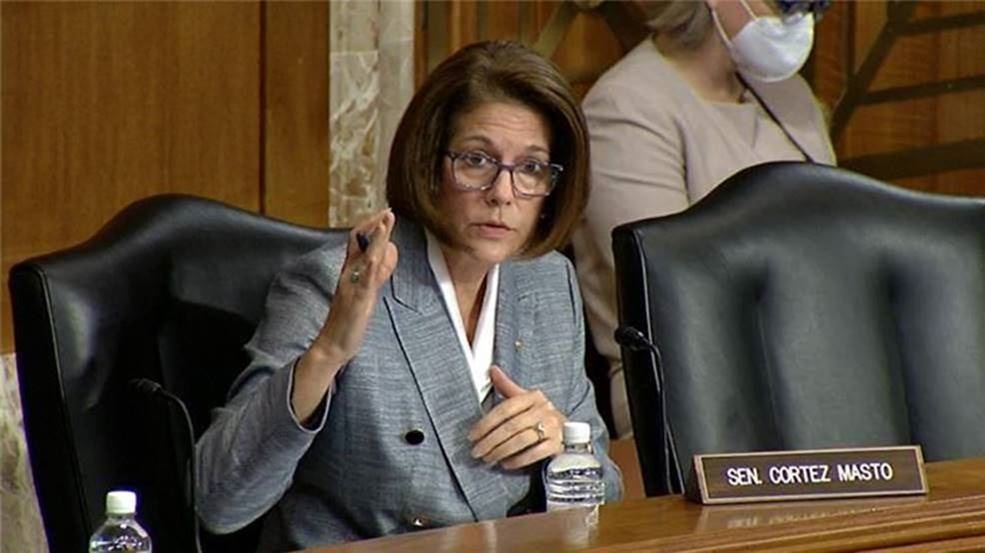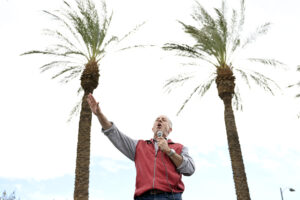Harry Reid must be so proud.
“Revision of our mining laws has been a regular topic for more than 100 years,” Reid wrote in 2009 when he was Senate Majority Leader. “During my time in Congress, I have fought against and defeated many ill-conceived reform efforts that would have hurt rural Nevada.”
Reid was being modest. He fought against and defeated every effort, no matter how ill- or well-conceived, to reform the antiquated 1872 Mining Law when he was in the Senate.
This week, Reid’s successor, Democratic Sen. Catherine Cortez Masto, kept alive Nevada’s hallowed tradition of protecting gold mining corporations from having to pay federal royalties on minerals taken from federal lands.
Officially, the Senate Energy and Natural Resources Committee conducted a hearing Tuesday. But for Cortez Masto, it was a campaign event, designed to shore up what little support a Democratic senator might hope to garner from rural Nevada voters, and more importantly, encourage Nevada Gold Mines – the unholy alliance between Barrick and Newmont that accounted for three-fourths of the gold mined in Nevada in 2020 – to politely refrain from spending a bundle against Cortez Masto as she seeks reelection in 2022 against Big Lie conspiracy peddler and Westerner wannabe Adam Laxalt.
Cortez Masto requested the hearing from committee chair Joe Manchin so she could publicly and eagerly share her opinion that making the gold mining industry pay federal royalties just like other extraction industries, as House Democrats have proposed, would be terrible, horrible, no good and very bad for her campaign. OK she didn’t actually say the “for her campaign” part.
But it was loud and clear anyway.
“I am sooo pleased” (seriously she added extra vowels to the word “so” for emphasis) “to be able to introduce” Barrick Gold Corp. General Counsel Rich Haddock, Cortez Masto gushed after Manchin asked her to welcome the mining executive near the start of the hearing.
Later Cortez Masto asked Haddock to please explain why even though coal and oil and natural gas pay royalties on minerals extracted from public lands, the gold mining industry shouldn’t have to do that because, you know, eww, icky. That’s a paraphrase, but not much of one.
Yes, senator, eww, icky indeed, Haddock replied, or words to that effect, most of them having to do with the myth, perpetually pushed by the industry, that because gold mining is expensive it deserves special treatment — a contention that no doubt amuses, but not in a nice way, federal royalty-paying oil, gas and coal companies.
That long-running myth — that the gold mining industry is dainty and precious and must be treated as such — was a recurring talking point from the almost exclusively industry-friendly folk providing testimony at the hearing. As it has whenever reform of the 1872 Mining Law has come up in Congress over the last several years, the industry said Tuesday that if it must pay a royalty, it should mirror Nevada’s mining tax, apply only to net rather than gross value of gold, and thus allow multiple generous deductions.
Which brings us to Maine Sen. Angus King. The political point of the hearing may have been to declare the House Democrats’ reform bill DOA while showcasing Cortez Masto. But on the policy front, King stole the show, by raising something the mining industry is historically unaccustomed to hearing from Nevada U.S. senators: Common-sense questions.
“Why shouldn’t it just be a royalty based on the value of the minerals extracted, just as in oil and gas or coal?” King asked Katie Sweeney of the National Mining Association.
“Because there isn’t a value to the mineral before it gets refined,” Sweeney said.
“If there’s no value to the minerals why are you digging them out of the ground?” King asked. “There’s a value somewhere,” King continued. “Eventually this is for profit… So why can’t the royalty apply to value that you derive from the mining?”
Silence momentarily fell over the room (as heard and seen via video, anyway). While waiting for an evidently stumped Sweeney to respond, King, on behalf of grateful fans of reason everywhere (except Nevada), shrugged, then added “It seems pretty straightforward to me.”
Sweeney said that was an “oversimplification,” which is a thing lobbyists for any and all industries can be relied on to say while advancing a specious proposition.
Gold has to be taxed differently than oil and gas and coal, Sweeney suggested, “otherwise we wouldn’t have any investment in the United States, because there’s so much up-front capital…”
To which King was like … seriously, wtf?
“The royalty only applies after you’re making money,” King observed. “A royalty doesn’t apply up-front… You’re digging things up out of the ground, you sell them, you get a revenue stream, and you pay a royalty. That’s part of the cost of doing business for these other industries. Why doesn’t that operate for you?”
Sweeney, having had quite enough of King and his pesky questions, tagged the Barrick ringer, Haddock, so perhaps he could explain why gold is so special.
After a few moments of nervously filling the air with words that he could see weren’t landing anywhere, Haddock circumvented the subject by praising Nevada’s super deduction-heavy system for taxing (or not taxing) gold.
“The system works very well,” Haddock happily declared.
The Nevada system
Nevada’s system worked so “very well” last year that about a third of the gold mines operating in the state declared so many deductions they paid no state mining taxes at all.
Those are not Nevada’s largest mines by any stretch. But in total they mined well over a third of a billion dollars of gold on which exactly zero state mining taxes were paid.
Some of those mines are serial freeloaders. Add this year to the previous five, and Jerritt Canyon, acquired earlier this year by a Canadian company called First Majestic, has produced just shy of a billion dollars worth of gold in Nevada, and paid zero mining taxes to the state general fund.
And last year, as every year, Nevada’s largest mines also managed to pay taxes on far less than the full value of gold they produced, thanks to deductions. Here’s the rundown for mines operated by Nevada Gold Mines — the Barrick-Newmont joint venture — which include the (by far) four biggest mines in the state, and the aforementioned three-fourths of Nevada gold production.
In total, 31 “active operations” listed on the Nevada Tax Department’s annual report produced $8.41 billion worth of gold in 2020, and after deductions, paid taxes on $3.27 billion. In other words, no taxes were paid on 60 percent of the gold produced in the state.
Gold accounts for about 90% of Nevada mineral production from year-to-year. But the industry is always keen to remind politicians and the public that gold isn't the only mineral mined in Nevada. So let's take a look at the commodity that is second to gold, copper, which accounts for about 5 percent of the state's mineral production.
There's only one significant copper mine in Nevada, the Robinson Mine in White Pine County, owned by a Polish mining company called KGHM Polska Miedź S.A. Over the five years from 2016 though 2020 inclusive, more than $1.8 billion worth of copper was produced at the mine.
After taking deductions worth 84 percent of the copper's value, the mine's operators paid a total $14.4 million in Nevada mining taxes over those five years. The effective total tax rate on the $1.8 billion worth of copper produced over the five-year period equals eight-tenths of 1%.
So Rich Haddock of Barrick is right. Nevada's system "works very well." For mining companies
Oh and by the way, earlier this year the Nevada Legislature accidentally lucked into imposing a 1.1% tax on gross sales (about 1/4 the size of the royalty U.S. House Democrats have proposed) on mines that gross more than $150 million a year. The new tax doesn't apply to copper.
Home means colonialism
Also at Tuesday's hearing, New Mexico Democratic Sen. Martin Heinrich said he was “disappointed that we don’t have a witness here today who can testify to the impact that our tens of thousands of abandoned mines have on neighboring communities.”
Dang. If only Cortez Masto had invited testimony from members of the Yerington Paiute Tribe, whose water was contaminated by an abandoned Anaconda Copper mine. It must have slipped her mind.
The environmental costs of continuing to allow mining to operate under a 150-year-old law -- not just the water and air contamination and ground spoliation, but also the climate impacts of emissions and energy consumption -- are indefensible, especially considering all that destruction and pollution is committed to produce a commodity for which the primary purpose is stocking the earring counter at Target.
One of the purposes of a federal mineral royalty would be to pay to clean up the ecological messes the industry has left behind.
A portion of federal mineral royalties on oil, gas and coal are also shared with the state where the minerals are mined, and the same would apply to gold under the reform the House is considering. Even under that version of a mining reform bill, Nevada’s share might be only $30 million or $40 million a year. If a federal royalty copied Nevada’s state model and was another deduction-fest, it would be far less.
But don’t be surprised if environmental and royalty reforms to the 1872 law both fall by the wayside yet again. Nancy Pelosi let a reform bill die in the House a couple years ago. When it comes to unconditional love and support for the mining industry, you see, Cortez Masto has nothing on Nevada Democratic Rep. Steven Horsford.
At their hearing this week, Manchin, Cortez Masto and the industry all made nice noises about reaching a compromise on mining reform.
Reid, then-Rep. Dean Heller, and the industry politely made the same nice noises the last time there was a serious push for reform a dozen years ago. Nothing came of it.
If Cortez Masto is truly a worthy heir to Harry Reid, that’s what will happen this year: Nothing.
And multinational gold conglomerates and their shareholders in the U.S. and abroad will continue to think of Nevada, if they think of it at all, as an economic colony, a Podunk backwater from which to extract wealth, led by docile and easily manipulated political leaders who don't know any better than to be taken advantage of by what in the 21st century is at best a third-tier industry.
Our stories may be republished online or in print under Creative Commons license CC BY-NC-ND 4.0. We ask that you edit only for style or to shorten, provide proper attribution and link to our website. AP and Getty images may not be republished. Please see our republishing guidelines for use of any other photos and graphics.





Hugh Jackson